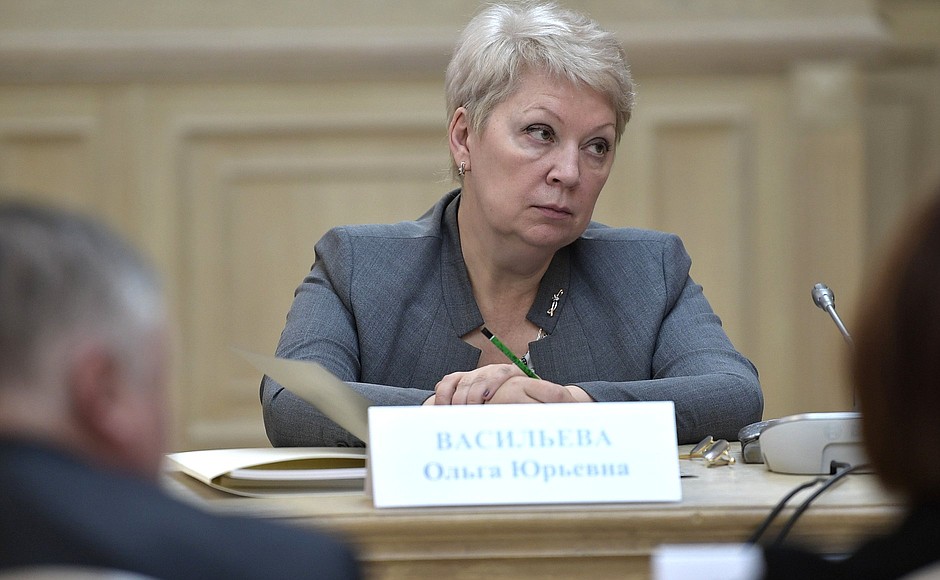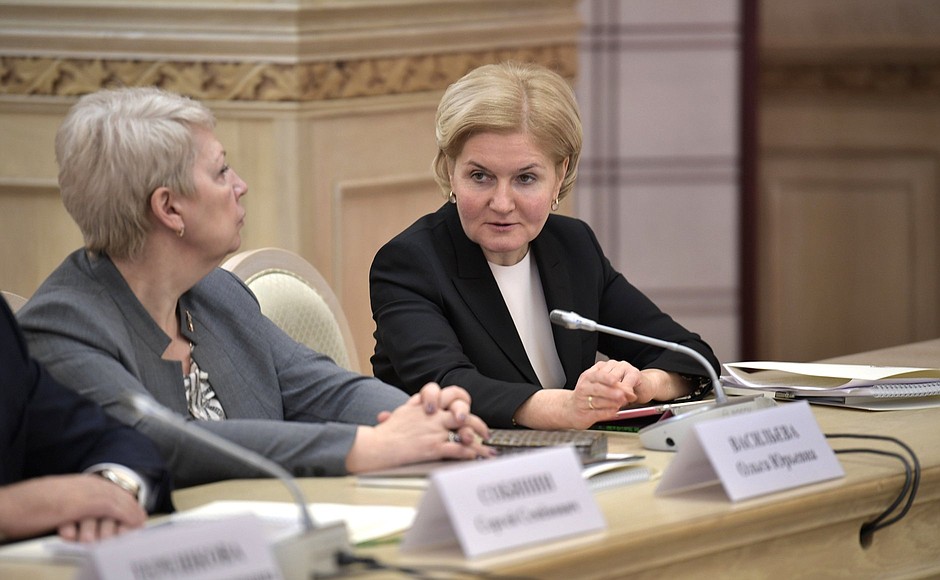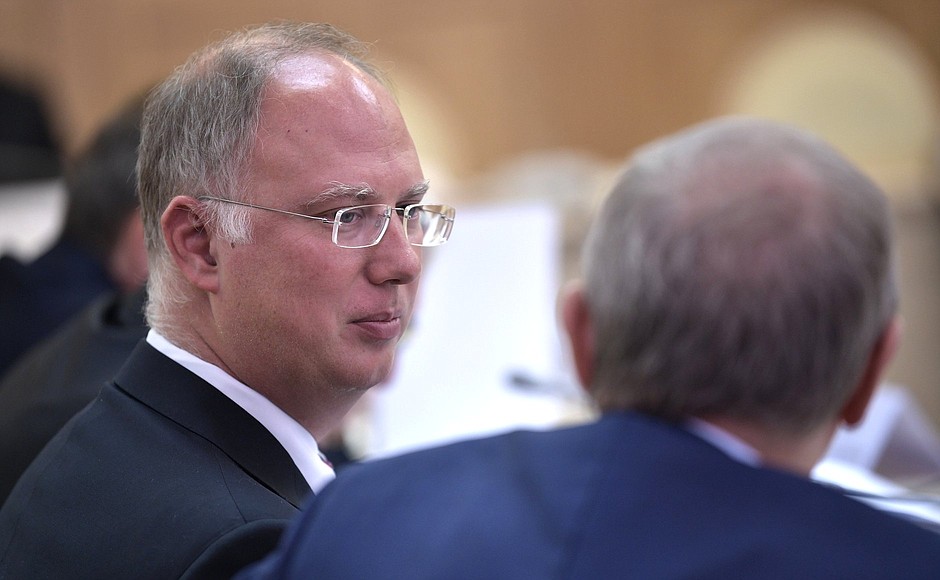On the agenda were the interim results of the programme for developing MGU through to 2020 and progress in developing the Vorobyovy Gory science and technology cluster.
Other items on the agenda included developing fundamental science and the higher education system within the National Science and Technology Development Strategy, and measures to improve training of specialists and facilitate their employment in Russian companies.
* * *
Excerpts from transcript of Moscow State University Board of Trustees meeting
President of Russia Vladimir Putin: Good afternoon, colleagues,
We are holding this latest meeting of the Moscow State University Board of Trustees on the day of the university’s founding, which, as you know, has become by tradition a date celebrated by Russia’s students as their holiday. Let me therefore congratulate all of Moscow State University students and faculty and actually, all students and faculty around the country. I congratulate you on this occasion and wish you all the very best.
I would like to thank the Board members for their active participation in the university’s life. I suggest that today we discuss some of the decisions that will enable the university to continue playing a determining part in shaping Russia’s intellectual and technological potential.
The university has always been proud of its graduates, and justifiably so. They make unique scientific discoveries, achieve success in business and civil service, carry out important social, cultural and educational projects and bring glory to the country and to their alma mater.
If we judge the university by the results and achievements of its graduates, Moscow State University counts deservedly among the world leaders. This raises MGU’s prestige and influence both at home and abroad.
Our universities, including MGU, have made significant advances in different ratings in a number of areas. At the same time, we have said before that piecemeal success is not enough. We need to set more ambitious goals and join the ranks of the world leaders, above all in training top-class specialists and in contributing to the development of new breakthroughs and of science in general.
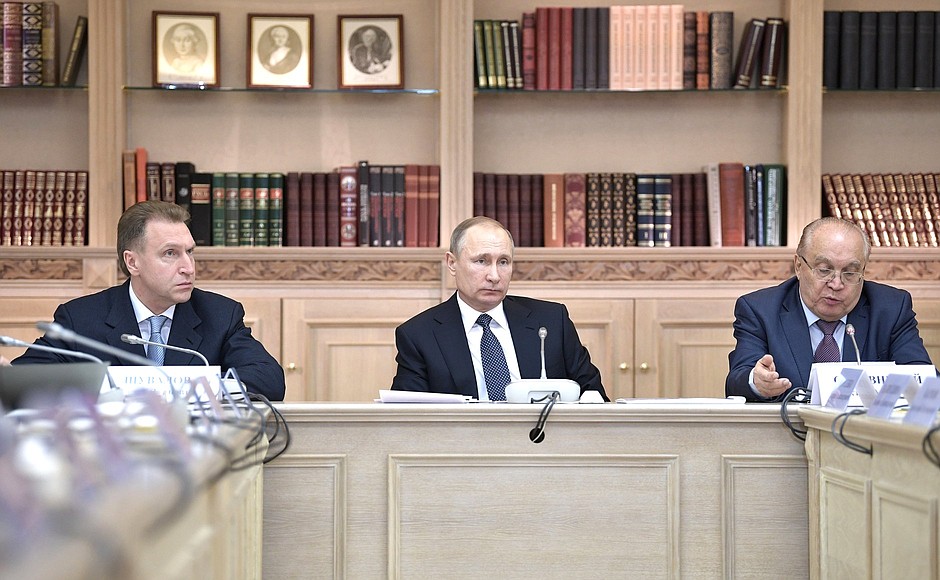
It is also our responsibility before the young generation to reach this ambitious and absolutely vital objective. We have many talented young people who seek a high-quality and competitive education and want to take part in promising research, projects and developments of the highest level, right from their student days.
Ever since the days of Mikhail Lomonosov, Moscow State University has always attracted the most talented and driven young people from all around Russia. Last year, 371 winners and runners-up of national Olympiads and 9 winners and runners-up of international Olympiads were accepted to MGU. Young people who have shown particular talent in technical and humanitarian fields study at the university and have received special grants of 20,000 rubles a month. We will continue to support talented children from throughout the country.
[Rector of MGU] Mr Sadovnichy said that the university school has started work and its students have already gone to the Sirius Centre in Sochi, where they attended lectures by scientists, business representatives and other prominent and interesting people who have achieved exceptional results in their fields of activity.
I draw to the Board members’ attention that we must ensure the required conditions not only for study but also for subsequent employment of these gifted young people in the state agencies and in Russian companies. They should have an interest in working here for the benefit of our economy and our country’s development.
I ask you too to reflect on further measures we can take to support student teams already working on promising new developments in the sectors of greatest priority for the country. This could include measures to integrate their projects with the activities of the world-class laboratories that have also been established at MGU through the so-called mega-grants programme.
Let me note in particular that many of these laboratories are headed by compatriots who had been working abroad. More of them are coming home now and working here, and this includes Moscow State University graduates.
Colleagues,
We adopted the National Science and Technology Development Strategy at the end of last year. Its implementation will enable us to make our country more globally competitive and respond to the serious ‘big challenges’ that practically all countries face today.
In this respect, I think that we should review once again the development programmes for our leading universities, including Moscow State University. The idea here is to establish and develop so-called technological valleys. You know that Moscow State University is examining just such a project. I want to ask Mr Viktor Sadovnichy to tell us how this work is going and update us on Moscow State University’s development plans in general.
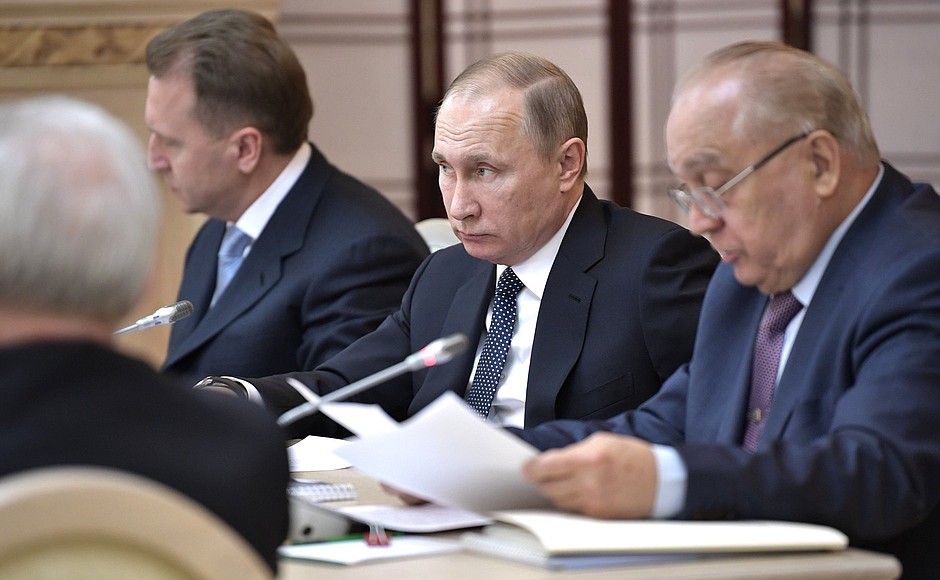
Let’s begin our work. Please, you have the floor.
Rector of Moscow State University Viktor Sadovnichy: Mr President, thank you for these congratulations and for these warm words about the university.
Colleagues,
Yes, today is our birthday, Moscow State University’s biggest holiday, the day marking its founding. Your executive order in 2005 gave this date official status as Russian Students’ Day. We are deeply grateful to you for the constant attention you give to developing science and education in Russia, to MGU’s life, and to the decision to hold a meeting of the Board of Trustees at the university today.
We will look today at Moscow State University’s development. I would like to speak in brief about what we have accomplished since the last Board of Trustees meeting took place just over a year ago, and tell you about our plans for the future.
Since 2010, we have been working on implementing the development plan that you, Mr President, approved. Budget funding for the development programme from 2010 through to 2019 comes to around 11 billion rubles. MGU’s contribution through various means to this programme comes to around 50 billion rubles. The programme continues with success and I will now brief the Board of Trustees on the results.
Our main task is to teach. As you know, Moscow State University works according to its own independently set educational standards. These are unique standards that exist only in our university. We have set a six-year study programme or so-called integrated Masters course, for a number of disciplines. In other words, the course involves four years at the undergraduate degree level and then a two-year Masters programme in the same field, mathematics, physics or biology say, thus making a six-year programme overall. Such was our choice.
We had 10,000 graduates in 2015, and more than 7,000 in 2016. As was said, they are good specialists in their fields. We have taken responsibility for the six-year study programme experiment and have added to student living allowances from our own funds to cover the sixth year of study, and we are sure that study programmes of this length are what are needed to develop a modern knowledge economy in a modern country.
Good students become good specialists, and good school pupils become good students. The university’s affiliated boarding school, the Kolmogorov Boarding School, has been running for more than 50 years now. Its graduates count 8,000 doctorate holders – one in four graduates has a doctorate. The school also counts more than 800 holders of post-doctoral degrees, five academicians, and prominent members of the business community among the ranks of its graduates.
Mr President, as we discussed earlier, we opened another school on a new site here on September 1. The school has 6 buildings and unique infrastructure, and talented children from around the country are studying there now. We held several selection stages. During the final stage, they went through a preparatory course at the Sirius Educational Centre. We are sure that this new university-affiliated school will soon become the school of the future.
The high level of our graduates has received recognition here and abroad. According to the Russian Education federal website, MGU is in first place in terms of the number of its graduates on the boards of Russia’s biggest companies. We are in first place too among universities as the ‘forge of oligarchs’. We are not a university specialised in the technical fields, but even so, we are in second place in terms of demand for technical specialists trained by us. A recently published global rating that ranked universities in terms of their graduates’ employment put us in third place, after Stanford and Oxford, in terms of graduates’ success around the world.
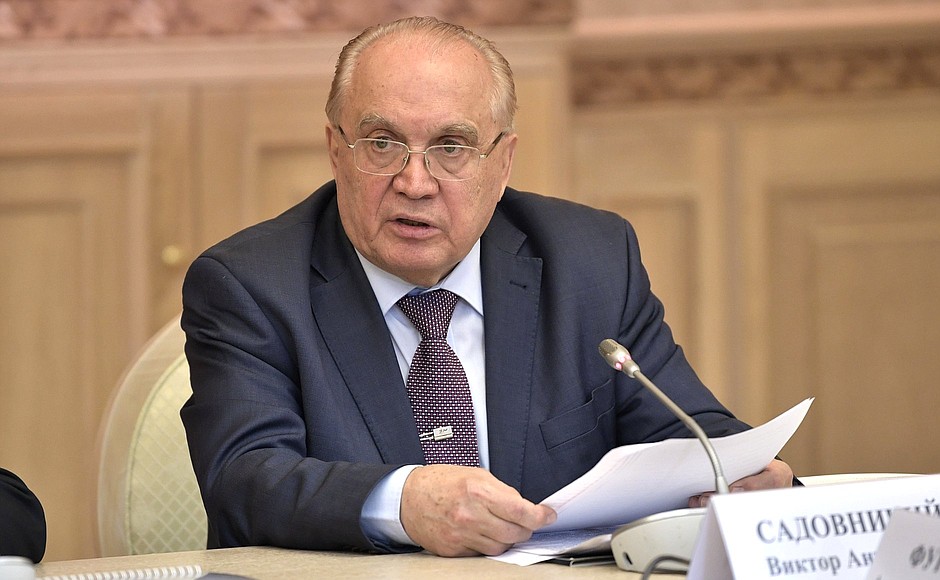
And a couple of words about ratings. This is a sensitive issue for Moscow State University and for other Russian universities, as you know. The well-known international ratings are shaped to the Anglo-Saxon model and give our universities rankings that, in our opinion, do not reflect the reality. You gave the instruction to develop an objective, international rating system that would reflect universities’ work objectively. Moscow State University is heading this work. We have created the Moscow international rating Three Missions of the University, and it is now at work and collecting information. We held talks with universities in China, India, Iran, Turkey and Japan, and they have given their support. We will publish the rating’s first results this September, Mr President, acting on your instruction.
As the country’s leading university, Moscow State University also has an important international mission to perform. I will say a few words about this. We have already opened five branches in the CIS capitals (Astana, Baku, Tashkent, Dushanbe and Yerevan, where 3,000 students are studying. These universities were opened at the request of these countries’ governments). In just a few days, we will add a branch in Slovenia, a NATO member country. I know that the Slovenian President’s visit is on the programme, and he will put this question of opening a branch of MGU in Slovenia.
Russian is the language of teaching at these branches. This is another step forward in the educational space. We want to spread our culture and language.
MGU and Beijing Polytechnic recently established a joint university. It has already received a licence to conduct educational activity. The main building’s cornerstone has been laid. They want to build a copy of the Moscow State University building and have already begun construction. They plan to complete construction by 2018, and the university will then take 5,000 students a year. This is a joint university, but, starting this September, we plan to begin classes for several groups in a temporary building. We have an interesting letter that the Russian Consulate in Guangzhou has received, speaking of the growing interest among various sections of the population in China in eventually studying at this joint university.
Finally, Moscow State University has 10 Lomonosov centres in different countries. These centres are engaged in spreading Russian language and culture. The branches and the centres are all part of this work. We see this as the kind of ‘soft power’ that works to bolster our country’s image.
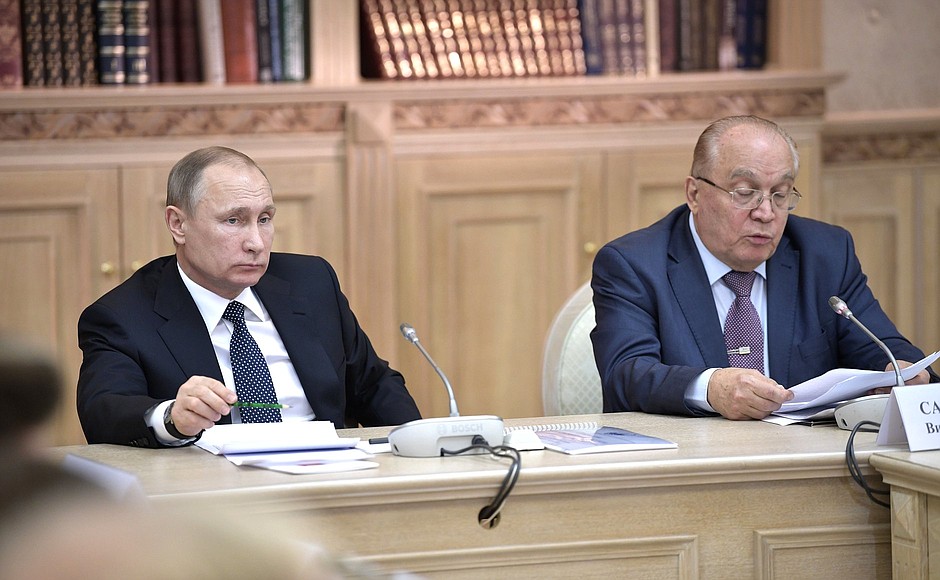
I must mention too our excellent branch in Sevastopol. It was established in 1999. Back then, I indicated from on board the Moskva cruiser a part of the branch that had just opened, Mr President. There were difficulties in branch’s work in the past, but now it is one of the best universities in southern Russia with a very good infrastructure. They currently have 700 students from Crimea, Sevastopol and other Russian regions. One of the teachers has the highest h-index [Hirsch index ranking for citation of publications] in Crimea and Sevastopol. In other words, they have good teachers there.
The recent meeting of the Presidential Council for Science and Education noted that our priority should be to ensure leadership in chosen fields and not take an approach that depends on importing technology. We try to direct our research at Moscow State University in these priority directions.
I will start with information technology, a very important field today, as it determines a country’s level of development and influence. A supercomputer race is underway in the world and we cannot stand on the sidelines. Our Lomonosov supercomputer is the most powerful in Russia and has a good place in the world in general. It has a speed of three petaflops today, and we plan to bring its power up to five petaflops over the next few months. Supercomputing is becoming essential now for all high-tech tasks. Work with Big Data is becoming ever more important.
Let me give two examples. First, information technology is essential for ensuring computer security and protecting data transfer. This uses what are called hash functions, the electronic equivalent to fingerprints, and you need to check how reliable this protection is. Our young teachers and students, using the Lomonosov supercomputer, recently set a world record for compromising the most complicated hash function. They have all stayed here and will work in Russia.
The second example. The recently approved National Science and Technology Development Strategy focuses on overcoming global challenges. Use of information technology and development of the digital economy are among these challenges. At MGU, we are establishing a national digital economy competence centre for research and training. A good foundation has already been laid by joint work with the Russian Academy of Sciences’ IT and Management Federal Research Centre, under Academician Igor Sokolov, other research organisations in the real sector of the economy, and the state agencies.
We plan to use our supercomputer to go a step further and set up an experimental segment using Russian-made Baikal processors, in order to have our defence and civilian industries move to using Russian supercomputer technology and software, and most importantly, train specialists. Leading Russian company T Platforms is developing the components base, and a number of ministries are already using these developments. Our proposals in this area have received the President’s support. We received the instruction to start this work with the Industry and Trade Ministry, and we have done so.
In the field of space research, we are probably the only university in Russia and in the world to launch so many satellites. Over the 60 years of space exploration, we have placed instruments on 400 satellites designed by scientists and postgraduates at Moscow State University. We have six satellites – a whole fleet – to our name. I spoke about our preparations to launch the Lomonosov heavy satellite, made by Moscow State University, at the last meeting. Our Lomonosov satellite was the first satellite launched from the Vostochny Space Launch Centre in April 2016. We remember this launch, Mr President, and your decision at the site to have the satellite launched the following morning. Of course, we want to thank you for that decision.
This satellite carries what is an ambitious scientific programme for the university. We have registered powerful ultraviolet flashes, discovered more than 10 space gamma-ray bursts, and register potentially dangerous natural and manmade objects. In general, the information obtained (it is still coming in from orbit) makes this satellite the most successful recent space project.
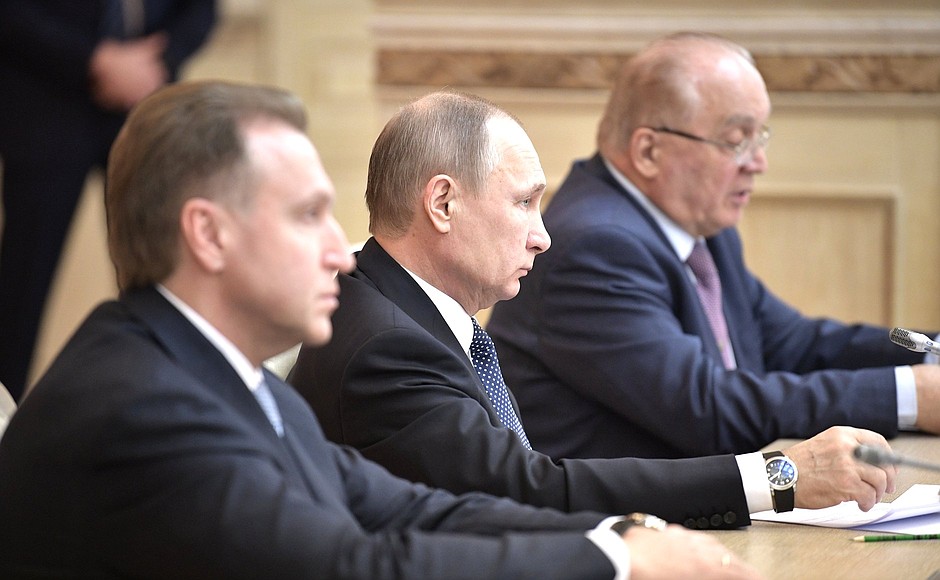
Another of our successes in the space field. Gravitational waves were recently recorded for the first time in what was a very important scientific breakthrough in the world. They were generated by the merger of two black holes with a mass of 29 and 36 times the mass of the sun. This happened 1.3 billion light years away, but the signal has reached us now. Physicists from Moscow State University, the Braginsky group, played a big part in this. MGU’s robotic telescope is carrying out the most extensive and rapid search for the source of these two black holes’ merger.
We proposed a new space project: Create a satellite group to monitor in real time the radiation situation, and potentially dangerous natural and manmade objects, space junk, asteroids, meteorites and so on in the near space. Mr President, you gave the instruction to carry out this project together with Roscosmos, and this is what we are doing.
Moscow State University decided recently to open its 43rd faculty, the faculty of space studies. It will train specialists in important fields related to outer space, such as space medicine, biology, training cosmonauts for spaceflight and their behaviour in weightlessness, study of various not yet explained phenomena in space, information technology, and development of new instruments, of course. This faculty’s scientific director will be twice Hero of Russia, pilot and cosmonaut Vladimir Solovyev. Classes at this new space studies faculty will begin this year.
Of course, one of the top priorities for every country is the science of life. This field is developing intensively at the university, in particular, at the Faculty of Fundamental Medicine at the Medical Research and Education Centre. And we want to report that our medical centre is operating well: in under a year, 1,030 patients underwent treatment there and over 500 complex surgeries were carried out. Recently, the Institute of Regenerative Medicine opened at the medical centre. This is a unique institute in Russia. At 400 square metres, it is the largest laboratory in Russia and Europe, meeting the highest standards of cleanliness. Cellular therapies and pharmaceuticals will be studied here. The Healthcare Ministry recognised both the faculty and the centre as the flagship for training staff in the field of regenerative medicine.
In this regard, I would like to report that we will create a national anti-doping lab, under the President’s instruction. This provides us with new opportunities, including with respect to scientific research. This lab will become an organic part of our medical centre and faculty, and will be involved not only in analysis but also in research. We are ready and are implementing this presidential instruction and have already established this anti-doping lab. But we propose to house it at Moscow State University. Here we have a very good building and have already developed a project to renovate it. But we would like to ask you to include us in the federal targeted investment programme, so that we will be able to renovate this building as soon as possible and get the lab fully running according to the agreement with WADA.
Of course, this project is very prestigious and it will meet world standards, according to which anti-doping labs are located at independent institutions, like the Moscow State University. We would just like to include our project in the investment programme to renovate the building more quickly.
I would also like to point out that the effectiveness of science today is evaluated on the basis of publications, but we do not always agree that this alone determines a scientist’s standing. We believe that our Russian journals should be included in the lists that are cited by other databases. However, in the present situation, Moscow [State] University has very high citation indices. Moscow State University’s citation indices are double the Russian and international levels in terms of the share of frequently cited articles. We are double the world level. This means that we do not conduct routine research but are on the cutting edge of science and working on breakthrough subjects.
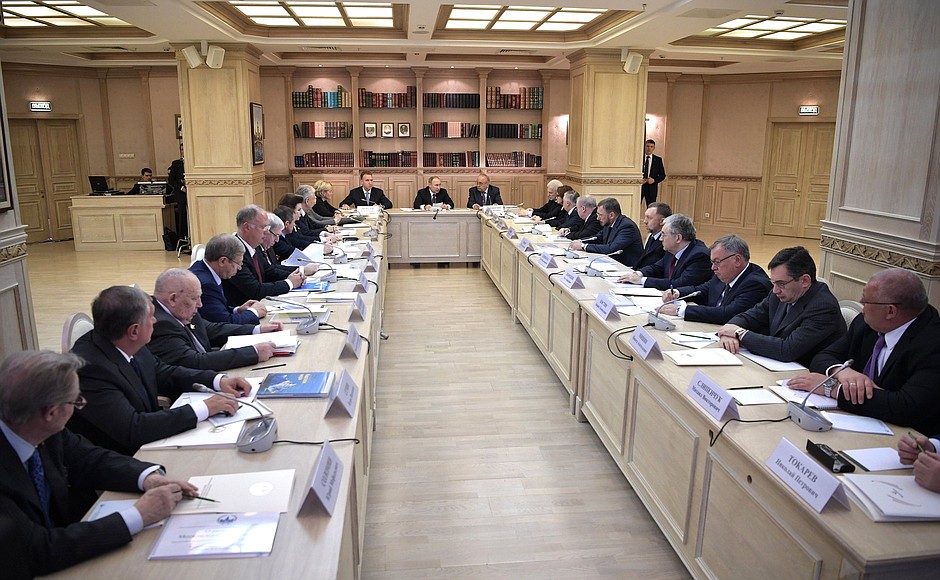
Finally, I would like to bring up a very important matter (Mr President has already raised it). We continue to develop new territory. This refers to our scientific-technological valley. We have already built about 1 million square metres of new space in the new territory and during these 10–12 years we have doubled our campus [area]. Previously, 1 million [square metres] were built. We have doubled that. Members of the supervisory board have corresponding materials, photos of training facilities, labs and buildings. We have done a lot of work on the concept of our further territorial development. Seven main areas or clusters were identified. They correspond to scientific development clusters in Russia. This concept was approved by the academic council. It calls for the development of the country’s priority areas in science and technology. New-generation training and research facilities, labs, dormitories, sports facilities and other infrastructure will be built. The project has been finalised.
I would like to cite Nobel Laureate Michael Spence. He said: We will drastically change the situation if we invest in infrastructure, in making the education system more effective. We are in sync with the expert’s remarks.
The territorial development plan was supported at a public hearing by district residents, city residents and the Moscow city government. Interdisciplinary scientific-technological groups can work on this territory, a system of effective commercialisation of research and development projects will be created, and Moscow State University’s extrabudgetary financing sources will be expanded and diversified. Generally, the project’s implementation will strengthen Moscow State University’s positions and it will, without a doubt, be one of the world’s leading universities with powerful infrastructure. Incidentally, this is the only development opportunity for the university in the foreseeable future. There is no other opportunity.
We talked about our scientific technological valley project in detail at our previous meeting. Now is the time to start working on it. I have presented Moscow State University’s proposals, Mr President, and we are ready to carry it out. I hope that we will report the first results of our efforts to develop the territory and implement the project in the near future.
I consider it important to express our gratitude to all those who have provided and continue to provide substantial support and assistance to Moscow University.
Trusteeship is the university’s historical tradition. When the university was founded, Prokopy, Grigory and Nikita Demidov donated 21,000 [rubles], which was more than the student support budget provided at the time by the monarch. And then they also donated a mineralogy laboratory to the university. Generally, the charity tradition has never stopped, and members of the Board of Trustees continue this tradition. On behalf of the university’s entire staff, I would like to express our gratitude to all those who provide substantial aid and support.
I cannot name them all – there is simply no time for that, but I thank all those who have taken the initiative to establish corporate departments at Moscow University to train personnel for their corporations: Mikhail Gutseriyev, Vladimir Yevtushenkov and Oleg Deripaska. I would particularly like to thank Igor Sechin for his constant assistance, as well as Nikolai Tokarev, Sergei Chemezov, Grigory Berezkin, Oleg Grigor and of course, Sergei Sobyanin. I am certainly grateful to all he Board of Trustees members for supporting the university’s development.
A few words about another gift. Nearby is a gallery of Russian landscapes: 300 original paintings by Levitan, Vasnetsov and Shishkin. At the previous meeting I already thanked supervisory board member Sergei Bednov for handing over these paintings. However, recently, Vladislav Malkevich, former president of the Chamber of Commerce and Industry and prior to that a deputy to Nikolai Patolichev [USSR foreign trade minister] and general director of Expocentre, who assembled the collection, presented another 30 original paintings. Now I believe this collection has no equals in the world. It is on display here, on the seventh floor.
In 2006, another historical treasure was transferred to Moscow University: the personal archive (100,000 sheets) and library (630 publications) of Ivan Ilyin, a well-known philosopher and Moscow University alumnus. For over 40 years that library had been stored at Michigan State University, USA. Recently, it was given to Moscow University following the discovery of the philosopher’s last will and testament. We accepted the gift. Ivan Ilyin left his motherland in 1922. He became a prominent philosopher and remained a patriot of Russia and Moscow University.
There is another museum on the new territory in the Shuvalov building: the Art of Nature in Stone. This priceless collection of minerals, a true treasure, was donated by Primo Rovis, an Italian friend and trustee of Moscow University. You met him, Mr President, during one of your visits to the university.
In conclusion, I would like to say a few words about another person. It is simply that today, January 25, is the centennial of Ilya Prigogine, a well-known scientist and Nobel Prize laureate. He is 100 today.
As a child he left Russia with his parents in the first wave of emigration. In the troubled 1990s, in Brussels, he ran an aid project for Russian scientists (I was his partner on the Russian side; we were great friends). Hundreds of our scientists received support from sources he had found, and he also donated his personal funds to our scientists. They remained in Russia; they did not leave for another country.
Ilya Prigogine dearly loved Russia, always considered himself Russian and was a true friend of our university. In marking his jubilee, we revisit his research papers. After all, his theory of self-organisation in non-equilibrium systems, which explains, among other things, social processes, is relevant today like never before. Prigogine’s theory on how order emerges out of chaos, including in society, explains many things, in particular the events unfolding in other countries today.
I would like to ask all the Board of Trustees members to continue their support for Moscow University. We have an excellent opportunity to make our university an incontestable leader among the world’s universities. This is, above all, our desire to work. We want to work: 10,000 PhD and DSc degree holders, 300 Academy of Sciences members, 50,000 talented young students and 3,500 postgraduate students, as well as good, unique infrastructure and excellent research equipment. With your support, respected members of the Board of Trustees, we are destined to succeed.
In closing, I would like, on behalf of Moscow University’s multi-thousand-strong team, to thank our country’s President and chairman of the Board of Trustees – you, Mr President, for everything that you are doing for the university, for education and science in our country. We would like to assure you that we will do all we can to ensure the further development of Moscow University and national education and science for the benefit of our great country and our people.
Thank you.
<…>
Vladimir Putin: Ladies and gentlemen, I believe what I am going to say now is absolutely self-evident. Education is a perennial sphere of human activity. It is an eternal sphere of activity – the most attractive, the most exciting and the noblest. And the most in-demand. We should be grateful to Moscow State University for giving us this privilege: to support our country’s leading institution of higher education.
I would once again like to thank all members of the Board of Trustees. I know that many of you sincerely wished to be board members to become involved in Moscow State University’s life and activity, to influence its development and promote its development.
From what we have just heard, it is absolutely obvious that this is precisely what is happening. The Board of Trustees does not simply meet once every so many months but it supports Moscow State University in one way or another throughout the year, organises joint work in the most promising areas of research and creates infrastructure – both scientific and, as it turns out now, sport and fitness infrastructure.
It is very important – I spoke about this in my opening remarks and I would like to reiterate that it is very important to support our university graduates – in this case Moscow State University graduates – until they are employed. This is very important. Young people should understand from the very first year of their studies that they have a prospect of getting a good job in their own country both in terms of financial prosperity and in terms of self-fulfilment as top-rate specialists in the future.
Once again, thank you very much and let us wish all the very best to Moscow University and to all our students.
Thank you.
